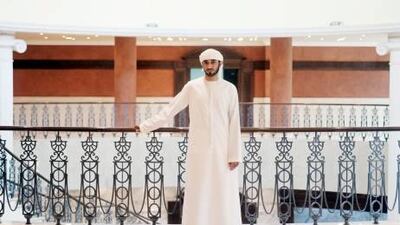DUBAI // This year's graduates speak positively of their university experiences, confident the system is improving and preparing them for life in the real world.
Haneen Al Tala, 23, has just graduated from the University of Dubai with a degree in finance and banking.
MORE UAE NEWS: Our pick of today's top local news stories
Last Updated: June 23, 2011
Universities to start year with Dh428m funds shortfall Institutions claim the funding system requires urgent changes as three of the country's largest universities face major shortages at the start of the academic year. Read
Fuel pumps to restart or Enoc, Eppco ordered to close in Sharjah Emirate's rulers announce ultimatum to Enoc after Sheikh Mohammed bin Zayed directs Adnoc to adress the month-long shortage. Read article
Dubai Zoo debate heats up The 20,000 square metre park is constantly criticised, with even officials admitting animals have hardly any space to enjoy. Read article
Expatriates reveal why they adopt national dress and customs Imitation may be the sincerest form of flattery but Emiratis say expatriates who adopt their customs and clothing should also conform to the behaviour expected of nationals. Read article
While the first 18 months of her course were not as taxing as she had expected at degree level, Ms Al Tala says standards have improved since the university received its accreditation from the Association to Advance Collegiate Schools of Business, based in the US.
"The assignments and tests weren't as tough as I'd have expected but a lot changed once they got accreditation and they were more accountable," she says. "Only 15 per cent of business schools have it so it clearly meant a lot to them."
Resources and teachers were on hand whenever necessary, says Ms Al Tala, from Jordan. If books were not immediately available the university found them and teachers were always on hand to help when needed.
But she is disappointed the university's long-planned move from Deira to Dubai International Academic City did not happen in her stay.
"I feel I missed out on this," says Ms Al Tala. "The move is something we've been telling the university should be a priority."
Dr Warren Fox, the head of higher education at the Knowledge and Human Development Authority in Dubai, which oversees the regulation and licensing of universities, says improvements are happening across the board.
"To keep up competitively, the universities have to keep up their standards," Dr Fox says. "Student satisfaction is becoming a bigger issue. Universities are concerned that they attract students and that employers hire their graduates."
He admits, however, there is still pressure for better facilities at Dubai International Academic City, where most of the emirate's 52 universities are located.
"We will be a better hub when we have better support facilities like dorms and leisure facilities," Dr Fox says. "These are coming in time and as they come, it will strengthen our position as a hub to attract students from the region."
Jamal Al Boloushi says his experience at the American University of Dubai has prepared him for working life.
The computer and IT technology graduate from Abu Dhabi knew just two words of English - "yes" and "no" - when he left for Dubai to live in the dorms.
Now Mr Al Boloushi, 22, is fluent in the language and in socialising with students of about 50 other nationalities.
"If I'd stayed in Abu Dhabi like my friends I would still be speaking in Arabic," he says. "I've never really travelled abroad but I've learnt so much about other cultures from this university."
With 3,000 students, the American University is one of the country's biggest private institutions.
Having studied several courses in business along with his IT subjects, Mr Al Boloushi says his education has been much broader than that of his friends who studied elsewhere.
There was plenty of lab space available when necessary, which was essential for his subject.
"When I go for interview, employers are very impressed that I've done so much in business as well," Mr Al Boloushi says. "It's recognised as a good university, too."
Shaikha Al Haddad, 21, will soon start work for the Dubai ambulance service. Having just graduated from Dubai Women's College, she says her higher diploma has given her an education of which she is proud.
"We even give seminars to medical staff, showing them how to do pre-hospital procedures," the Emirati says. "They know what to do in hospital but we teach them things like reading an ECG [electrocardiogram] and clearing airways.
"We've also been in schools teaching children first aid. I feel very prepared to go out into the workplace."
The college has also made Ms Al Haddad a more well-rounded person, she says.
"There is so much fun stuff to do like aerobics classes, the pool and gym, healthy food in the canteen," she says. "It's a very good student life and a nice place to learn."
Hend Ahmed, 30, is doing a master's degree in strategic human resources management at the University of Wollongong Dubai. Ms Ahmed, from Egypt, will graduate next year.
Standards are much higher than at the Modern Academy in Cairo where she took her undergraduate degree, she says.
"We didn't go so deeply into the subject and it was much more about book learning. It was hardly any different to school," Ms Ahmed says. "I have to work much harder to get good grades."
Unlike her home university, she describes the University of Wollongong as a "melting pot", where she can get a true picture of her new home, better preparing her for the diverse workplace she will manage.

